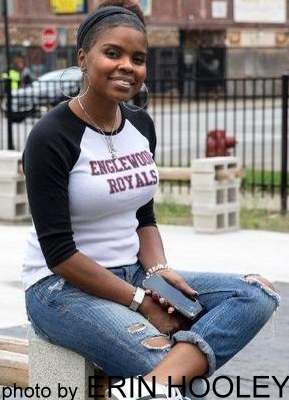broken promises in the promised land
I'M BLACK AND JEWISH AND ISRAEL ISN'T MY
HOME

by
TAMAR MANASSEH
_______________________________________________________________________
Tamar
Manasseh is the founder and president of Mothers Against Senseless
Killings. Follow her on Twitter @TamarManasseh
I recently
received an invitation from the Consulate General of Israel in
Chicago to visit Israel. I should have felt proud. I should have
felt honoured. I should have felt something. But I didn’t.
Imagine, a trip to the Holy Land, the land promised by God to
Abraham: I’d wanted to go for so long, but now that the
opportunity was being handed to me, I didn’t know how I
could do it.
 From
the time I was a student at Jewish day school, I’ve been
preparing myself for my inevitable pilgrimage to the land of our
ancestors. Many in the community I grew up in had strong connections
to Israel. Some had family there, others were educated there.
A few went to Israel to join the army. They looked as if they
were at home in the homeland of the Jewish people. At home like
I wanted to be, and imagined myself one day being.
From
the time I was a student at Jewish day school, I’ve been
preparing myself for my inevitable pilgrimage to the land of our
ancestors. Many in the community I grew up in had strong connections
to Israel. Some had family there, others were educated there.
A few went to Israel to join the army. They looked as if they
were at home in the homeland of the Jewish people. At home like
I wanted to be, and imagined myself one day being.
My trip
would be beautiful, I thought growing up. I would climb Masada
at dawn, float on the Dead Sea and, of course, I would pray at
the Kotel, the holiest site in the Jewish world. I imagined that
I’d be overcome by the sheer magnitude of the moment. I
could almost hear the earth-shattering echoes of the voices of
millennia of our revered ancestors and teachers. Just imagining
the trip, I could already feel the joy of becoming a part of the
history of that place, standing steps away from the wall I had
spent a lifetime turning toward, eastward in prayer.
But
I started to notice that the stories of people flourishing in
Israel all had something in common: They were about white Jews.
At some point, I realized that I didn’t have a single friend
who was Jewish and of African descent whose stories made me want
to book a flight.
I’m
from Chicago, so I grew up hearing the stories of the Hebrew Israelites,
Chicagoans who had relinquished their American citizenship to
return to the land of the patriarchs, only to be denied Israeli
citizenship and left stateless. Israel rejected the Black Hebrews
as authentic Jews, insisting they convert to Judaism to be recognized
as full citizens. They refused. Only in 2009, four decades after
their arrival, did Israel grant some Israelites citizenship.
Every
Israelite I had ever met had a horror story to tell. Their stories
didn’t conjure up the idea of a land flowing with milk and
honey. More like poverty and discrimination.
Over
the years, I heard and read more and more stories and personal
accounts that terrified me. Ironically enough, at the same time
so many of these revelations were being made, the choir at my
predominately African-American synagogue was learning a new and
more soulful tune for “Hatikvah,” Israel’s national
anthem, even as I was coming to terms with the fact that my soul
did not feel welcome in the land for which we so beautifully express
our love.
The
more I learned and the more I read, the more difficult it became
to sing the song. I read about the treatment of Mizrahi Jews,
who are discriminated against regularly. I read about Ashkenazim
who don’t want their children to attend the same schools
as Jews of North African descent. Soon after that I read about
the Ethiopian Kessim being forced to give up their age-old traditions
and conform to more traditional Jewish standards, even though
their traditions predated the Orthodox practices of European Jewry.
I read about how Ethiopian Jews face police brutality and discrimination
from employers. Ethiopian supermodel Tahunia Rubel called Israel
“one of the most racist countries in the world.”
Most
recently, I read how Israel decided to close the Holot detention
center where it incarcerated refugees from Africa. These Sudanese
and Eritrean refugees now face a choice: be deported to Rwanda,
or go to jail. This week, I read about how the Ministry of Interior
announced that Israel will begin issuing notices to African migrants;
they have until April to leave.
This
certainly was not my Promised Land. The more I read about this
very young country that I fell in love with as a child, the less
it sounded like my homeland. It doesn’t say anywhere that
Jews like me aren’t welcome in Israel, but Israel has shown
me, repeatedly, that this is true. How can I trust that I won’t
be swept up in the transport of Eritrean and Sudanese being deported
to, of all places, Rwanda? If Ashkenazi women can be physically
attacked while praying at the Western Wall, what might happen
to a black woman doing the same? What if I’m like the young
man from Kenya a few months ago, and I’m never allowed to
even leave the airport?
I love
to sing: in the car, on a stage, in a choir, in the shower. However,
I will probably never sing “Hatikvah” again. And if
I were younger I might even take a knee. In the same vein, I’ll
probably remove “L’shanah Haba’ah b’Yerushalayim”
from my Passover Seder song list.
Let’s
face it: I probably won’t be there, next year or ever.